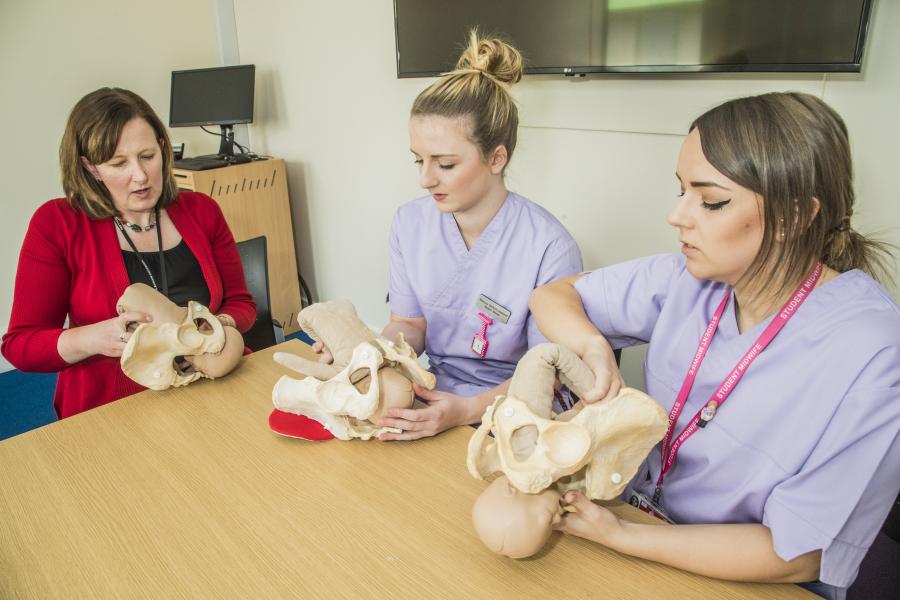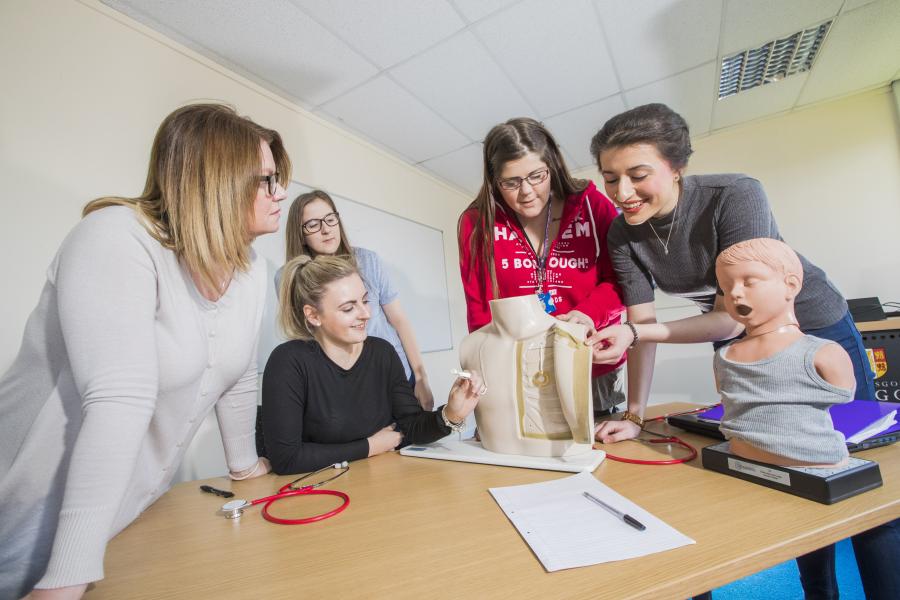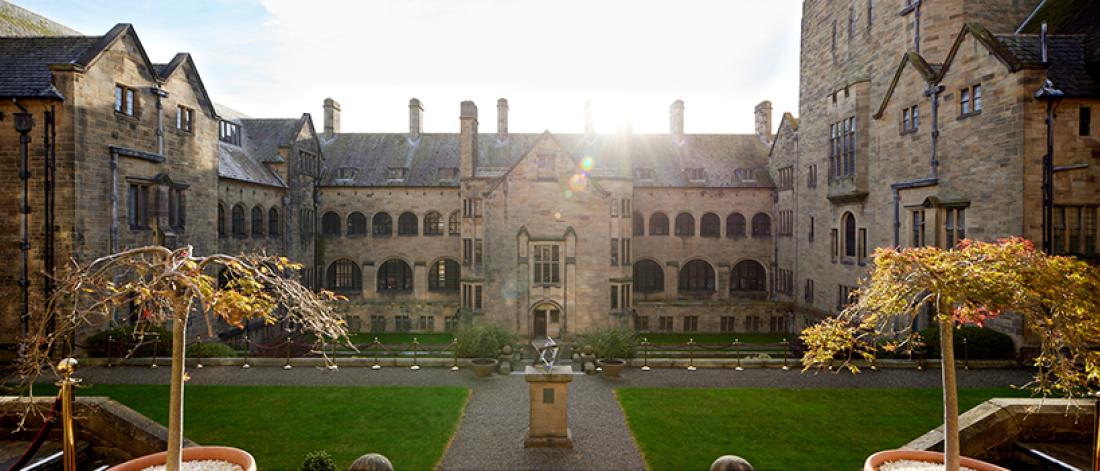About This Course
This course starts in March 2025 (2024/25 Entry) and in September 2025 (2025/26 Entry).
The role of the midwife in promoting normal, physiological birth is the main focus of this course and Bangor University is the only university in Wales with UNICEF Baby Friendly Initiative (BFI) accreditation. You’ll explore how the midwife strives to optimise maternal and new-born health and the childbirth experience for all women and their families and we offer clinical placements in a variety of settings that include community locations, maternity units and midwife-led units.
The School of Health Sciences offers a full-time three-year Bachelor of Midwifery (Hons) degree programme leading to registration as a midwife with the UK Nursing and Midwifery Council (NMC). This programme currently commences annually in September and is full time over 45 weeks each year with 7 weeks of set annual leave.
After an initial block of theory, clinical placement experiences, which make up approximately half of your learning, will introduce you to the role of the midwife, both in the community and hospital setting, where opportunities arise for you to attend home births as well as births in free standing midwifery led units and local maternity units. You’ll experience multi-disciplinary team working, in addition to academic staff working in partnership with local health providers, including Betsi Cadwaladr University Health Board, which ensures your learning is of the highest quality. Local geography will afford you the possibility of placement experiences in rural and remote settings. Our staff have a wide range of clinical experience at the forefront of their professional fields and in leading healthcare and medically-related research programmes which are transforming the quality and delivery of healthcare in Wales and internationally.
Additionally, we anticipate that elective placements still be available to you within the revised programme and in the past our students have used this opportunity to observe care provision across the UK and internationally.
Elements of the course will be available through the medium of Welsh and you’ll be supported to access the Coleg Cymraeg Cenedlaethol incentives. There will also be opportunities to experience bilingual practice in some parts of the region. For more information on the School's bilingual provision click here.
This course is currently validated against the Nursing and Midwifery Standards for Pre-registration Education, 2009. The programme will be revised and validated against the new NMC Future Midwife Standards (2019), including the NMC Standards of Proficiency for Registered Midwives, for September 2022 entrants.
The Midwifery Programme at Bangor University is currently the only one in Wales with UNICEF Baby Friendly Initiative (BFI) accreditation. BFI University Accreditation will ensure you’ll qualify with a firm foundation of evidence based knowledge in relation to breastfeeding. By ensuring that future midwives qualify with excellent knowledge and skills to support women to breastfeed, along with skills for life-long learning, the midwifery programme at Bangor University can make an important contribution to improving public health in Wales and beyond. Bangor University has an active Student Midwife Society (BUSMS) who have successfully raised money for local causes and have also organised, managed and hosted an ‘All Wales Student Midwives’ conference.
Early applications for Midwifery are strongly encouraged as the course usually fills all its places well before the end of the admissions cycle and Bangor can't guarantee to consider any applications submitted after the initial UCAS closing date in January each year.
Tuition Fees Covered
If you are considered a home UK student for tuition fees who can commit to working in Wales for two years after graduating, you could get your tuition fees covered in full through the NHS Wales Bursary Scheme and claim for a £1,000 bursary contribution towards living costs. You can also apply for the means tested bursary that is dependent on household income and other funding that has eligibility criteria for child care support, dependents allowance and parental learner allowance. You can also apply for the income based maintenance funding and a reduced rate loan from Student Finance. As this course is funded by NHS Wales, we are unable to accept applications from international students.
Full details are available on our NHS funding page.
Why choose Bangor for this course?
- NHS funding currently available to cover fees and a contribution to living costs.
Course Content
You’ll have compulsory theoretical study and clinical placements in the community and hospital settings in North Wales. Closely-supervised placements enable observation of professionals at work and participation in delivery of midwifery care starting early in the course. Support is available from a personal tutor who is a registered midwife and an academic member of staff and also from a Practice Supervisor and Assessor, who are qualified midwives in the practice placement area. Theoretical and practical work is assessed through assignments, examinations, presentations and a clinical practice portfolio.
What will you study on this course?
The revised programme will be based on the domains and competencies outlined within the NMC Standards of Proficiency for Midwives (2019), which establish the philosophy and values underpinning the requirements for entry on to the midwifery part of the professional register:
- Being an accountable, autonomous, professional midwife
- Safe and effective midwifery care: promoting and providing continuity of care and carer
- Universal care for all women and new-born infants
- Additional care for women and new-born infants with complications
- Promoting excellence: the midwife as colleague, scholar and leader
- The midwife as skilled practitioner.
Both the theory and clinical components of each module must be successfully completed in order to progress to the next year of the programme. Learning opportunities are equally split between theory, in the University setting, and clinical practice. Theoretical work will largely be assessed utilising a variety of assessment methods, including practical assessments, group work and presentations. Development of midwifery skills will be summatively assessed by Practice Supervisors and Practice Assessors in the clinical practice area. You’ll also be assessed on the development of your professional attitude, behaviour, and competence.
Where will you study?
The theory part of the course will largely be provided through a blended, distance learning approach with some face to face sessions provided in our study centres in Bangor and in Wrexham, and possibly in other areas across north Wales
Successful candidates will be placed in one or two areas within the local health board, Betsi Cadwaladr University Health Board (BCUHB) with the possibility of some placements being provided in Powys Teaching Health Board (PTHB). Applicants selected for interview are expected to indicate their preference of placement area. If you are offered a place on the programme, we will strive to place you in your preferred placement area however, this cannot be guaranteed. Candidates must be aware that some placements during the programme may be across BCUHB and therefore across north Wales.
During practice placements, you’ll begin by observing midwives and other professionals at work. In order to develop your skills and competence you’ll be expected to participate, under supervision, in the delivery of midwifery care from very early on in the course. You’ll be expected to follow the duty rota of their Practice Supervisor and/or Practice Assessor whilst on practice placement, including weekends, bank holidays and night shifts giving you experience of the real life working patterns of midwives.
Within the programme, you’ll be involved in following a small caseload of women and their families throughout their childbirth experience. This will support you to achieve Domain 2 of the NMC Standards of proficiency for midwives, Safe and effective midwifery care: promoting and providing continuity of care and carer (NMC, 2019). At the end of the course successful students will have gathered a portfolio to demonstrate achievement of the NMC's standards of proficiency and professional behaviour to enable entry to the NMC's Register as a midwife.
Modules for the current academic year
Module listings are for guide purposes only and are subject to change. Find out what our students are currently studying on the Midwifery BM (Hons) Modules page.
Course content is for guidance purposes only and may be subject to change.
Facilities
- Skills simulation labs are available for clinical skill acquisition and practice, incorporating the use of high fidelity PROMPT models (Practical Obstetric Multi-Disciplinary Training) which are also used in the emergency skills training in practice.
Nursing facilities
- The University has newly refurbished clinical skills facilities which include a two bed High Fidelity suite, a seven bay ward and additional flexible clinical skills areas that provides a simulated environment that will help to prepare you for clinical placements.
- High Fidelity simulation involves the use of sophisticated life-like mannequins in realistic patient environments which have that the ability to mimic at a very high level a broad range of human body functions.
- This immersive learning will include using simulation to transport students to practical scenarios (via Virtual Reality Experience, VR), giving you the opportunity to practice skills and interact in real-time.
Course Costs
NHS funding - Tuition Fees and Bursary
If you are eligible for Home (UK) tuition fees and can commit to working in Wales for two years after graduating, you could get your tuition fees covered in full through the NHS Wales Bursary Scheme and claim a £1,000 bursary contribution towards living costs. You can also apply for the means-tested bursary that is dependent on household income and other funding that has eligibility criteria for child-care support, dependents allowance and parental learner allowance. You can also apply for income-based maintenance funding and a reduced-rate loan from Student Finance. Full details are available on our NHS funding page.
General University Costs
Home (UK) students
- The cost of a full-time undergraduate course is £9,000 per year (2021/22 entry and 2022/23 entry).
- The fee for all placement, international, and sandwich years is £1,350 (2021/22 and 2022/23).
- More information on fees and finance for Home (UK) students.
Additional Costs
There are also some common additional costs that are likely to arise for students on all courses, for example:
- If you choose to study abroad or take the International Experience Year as part of your course.
- If you attend your Graduation Ceremony, there will be a cost for gown hire (£25-£75) and a cost for additional guest tickets (c.£12 each).
Course-specific additional costs
Depending on the course you are studying, there may be additional course-specific costs that you will be required to meet. These fall into three categories:
- Mandatory Costs: these are related to a particular core or compulsory module that you’ll be required to complete to achieve your qualification e.g. compulsory field trips, uniforms for students on placement, DBS Check.
- Necessarily Incurred Costs: these may not be experienced by all students and will vary depending on the course e.g. professional body membership, travel to placements, specialist software, and personal safety equipment.
- Optional Costs: these depend on your choice of modules or activity and they are shown to give you an indication of the optional costs that may arise to make sure your choice is as informed as possible. These can include graduation events for your course, optional field trips, and Welcome Week trips.
Entry Requirements
Unfortunately as this course is funded by the NHS and students have to have placements in the local NHS Health Board we are unable to accept applications from international students.
B720 BM (Hons) Midwifery degree course
The entry requirements outline the minimum educational requirements. If selected, applicants will be expected to attend an interview and undergo further screening for entry into the Midwifery course.
Entry Process for Professional Courses
All applicants must satisfy a range of entry criteria – consult the NMC’s Standards for pre-registration midwifery programmes. NMC entry requirements include demonstrating good health and good character. The School requires all candidates to undertake a criminal record check and other requirements for demonstrating good character; the local Health Board will be responsible for setting the requirement for good health. The criminal record check will include an enhanced DBS check for the child and adult workforce including a check of the barred lists. Applicants who have lived outside the UK are also required to undertake a criminal records check in their countries of residence. Candidates with entry qualifications older than 5 years must demonstrate evidence of recent study at an appropriate level. For further information and advice please contact the School at health.applications@bangor.ac.uk.
Academic requirements
GCSEs: applicants must normally have, or be working towards, a minimum of five GCSE grades A*-C/9-4 including GCSE Welsh or English first language and Mathematics/Numeracy (or a recognised alternative qualification), but consideration is given to individual circumstances.
Recognised alternative qualifications for Welsh/English and/or Mathematics are Essential Skills Level Two in Communication and Application of Number, or Functional Skills Level Two in English and Maths (must be achieved within the last 3 years). The Irish Leaving Certificate minimum of O4 is the equivalent to GCSE Grade C/4.
Offers are tariff based, 112 - 120 UCAS tariff points for the Bachelor of Nursing programmes:
- A Levels: General Studies and Key Skills not normally accepted
- T-Levels in a relevant subject considered on a case by case basis
- BTEC National Extended Diploma: DMM - DDM
- Cambridge Technical Extended Diploma: DMM - DDM
- City & Guilds: contact us for advice
- International Baccalaureate Diploma
- Extended Project Qualification: Points can include a relevant Extended Project (EPQ) but must include a minimum 2 full A-levels, or equivalent
- Access: to include Distinction / Merit profile (maximum 9 Passes)
- Welsh Baccalaureate Skills Challenge
- Irish Leaving Certificate: 112 - 120 points from a minimum of 4 Higher Subjects
- FETAC QQI Level 5 Certificate in Nursing Studies: distinction profile
- NCFE CACHE Level 3 Extended Diploma
We welcome applications from mature students who are completing an Access HE Diploma or who have evidence of recent study at *Level 3 or above in the past five years which meets our entry requirements; please note that we do not accept NVQ Level 3/QCF Level 3 as a means of meeting our entry qualifications.
For a full list of accepted Level 3 qualifications, go to www.ucas.com.
Interview and selection for Bachelor of Midwifery BM
All applications for the Midwifery programme must be made through the UCAS system. The Bachelor of Midwifery programme is course code B720. Please see the information below “How to apply through UCAS”
UCAS provides great deal of information including information on academic tariff/credit if you are unsure whether you meet our minimum academic entry requirements.
You will be notified via UCAS if you have been shortlisted for an interview. The date, time and venue for the interview will be sent to you within this notification. Please visit the Interview and Selection for BM page to find out more.
Unfortunately as this course is funded by the NHS and students have to have placements in the local NHS Health Board we are unable to accept applications from international students.
B720 BM (Hons) Midwifery degree course
The entry requirements outline the minimum educational requirements. If selected, applicants will be expected to attend an interview and undergo further screening for entry into the Midwifery course.
Entry Process for Professional Courses
All applicants must satisfy a range of entry criteria – consult the NMC’s Standards for pre-registration midwifery programmes. NMC entry requirements include demonstrating good health and good character. The School requires all candidates to undertake a criminal record check and other requirements for demonstrating good character; the local Health Board will be responsible for setting the requirement for good health. The criminal record check will include an enhanced DBS check for the child and adult workforce including a check of the barred lists. Applicants who have lived outside the UK are also required to undertake a criminal records check in their countries of residence. Candidates with entry qualifications older than 5 years must demonstrate evidence of recent study at an appropriate level. For further information and advice please contact the School at health.applications@bangor.ac.uk.
Academic requirements
GCSEs: applicants must normally have, or be working towards, a minimum of five GCSE grades A*-C/9-4 including GCSE Welsh or English first language and Mathematics/Numeracy (or a recognised alternative qualification), but consideration is given to individual circumstances.
Recognised alternative qualifications for Welsh/English and/or Mathematics are Essential Skills Level Two in Communication and Application of Number, or Functional Skills Level Two in English and Maths (must be achieved within the last 3 years). The Irish Leaving Certificate minimum of O4 is the equivalent to GCSE Grade C/4.
Offers are tariff based, 120 -128 UCAS tariff points for the Bachelor of Nursing programmes:
- A Levels: General Studies and Key Skills not normally accepted
- T-Levels in a relevant subject considered on a case by case basis
- BTEC National Extended Diploma: DDM
- Cambridge Technical Extended Diploma: DDM
- City & Guilds: contact us for advice
- International Baccalaureate Diploma
- Extended Project Qualification: Points can include a relevant Extended Project (EPQ) but must include a minimum 2 full A-levels, or equivalent
- Access: to include Distinction / Merit profile (maximum 9 Passes)
- Welsh Baccalaureate Skills Challenge
- Irish Leaving Certificate: 120 -128 points from a minimum of 4 Higher Subjects
- FETAC QQI Level 5 Certificate in Nursing Studies: distinction profile
- NCFE CACHE Level 3 Extended Diploma
We welcome applications from mature students who are completing an Access HE Diploma or who have evidence of recent study at *Level 3 or above in the past five years which meets our entry requirements; please note that we do not accept NVQ Level 3/QCF Level 3 as a means of meeting our entry qualifications.
For a full list of accepted Level 3 qualifications, go to www.ucas.com.
Interview and selection for Bachelor of Midwifery BM
All applications for the Midwifery programme must be made through the UCAS system. The Bachelor of Midwifery programme is course code B720. Please see the information below “How to apply through UCAS”
UCAS provides great deal of information including information on academic tariff/credit if you are unsure whether you meet our minimum academic entry requirements.
You will be notified via UCAS if you have been shortlisted for an interview. The date, time and venue for the interview will be sent to you within this notification.
Please visit the Interview and Selection for BM page to find out more.
Careers
Midwifery graduates gain both an academic and professional qualification that is well-regarded by Betsi Cadwaladr University Health Board, Bronglais Hospital, Aberystwyth, the Countess of Chester Hospital and other educational partner placement providers in Wales and England.
Our employability record is excellent with our graduates securing positions across Wales, the UK and beyond.
Opportunities at Bangor
The University’s Careers and Employability Service provides a wide range of resources to help you achieve your graduate ambitions.
Internships
Bangor University runs a paid internship scheme within the university’s academic and service departments.
Student Volunteering
Volunteering widens your experience and improves your employability. Find out more about volunteering on the Students’ Union’s website.





